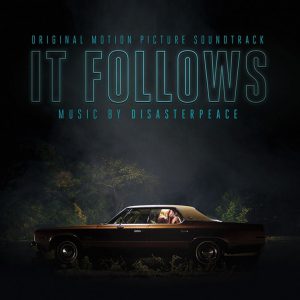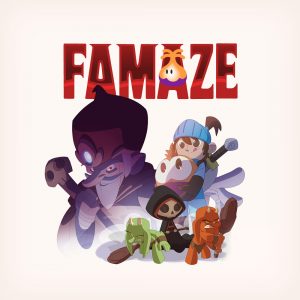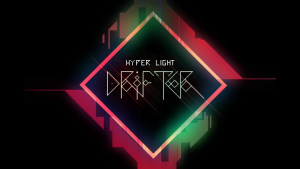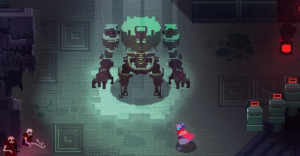Earlier this month on a rare rainy Bay-Area day, I sat down with composer and musician Rich Vreeland (aka Disasterpeace) to discuss last month’s theme of “Restriction”. Rich is best known for his work in video games having composed music for “Fez”, “Bit.Trip Presents: Runner2”, “Gunhouse” and the forthcoming “Mini Metro” and “Hyper Light Drifter”. Most recently his score to the critically acclaimed motion picture “It Follows” received unanimous praise.

Designing Sound: When you think of restriction what does it mean to you?
Rich Vreeland: It means a lot to me. It opens up possibilities to have restrictions. That maybe seems counterintuitive, but when you’re starting at the beginning, the possibility space for something is infinite. As a creative person, I don’t want to live in a such a huge space all the time. Having restrictions allows me to make something tangible. Otherwise, I’ll just drown in the infinite possibilities.
Restrictions can be challenging, they can also be beneficial. I’ve been fortunate to work on a lot of projects where I had the freedom to create restrictions for myself. Projects like “Famaze” or “Gunhouse” were open ended as to what I could do. I was given the keys to make whatever made sense. So a lot of times when I start working on a project, I like to start with an idea or an aesthetic. With “Famaze” it was about an aesthetic. It was about “what can I bring to this project that’s going to be unique, going to be consistent, that allows me to grow as a musician?”. For me at that time, that was trying to do an all FM synthesis soundtrack.
I was more laid-back about “Gunhouse” and so it was different. I approached it more from an angle of “what can I get out of this project myself, what do I want to accomplish that will make this fun and challenging?”. When I first started messing with software, I would just throw a bunch of loops in and be like “oh I made a song”. For a while, I had a stigma about that not being real music, not being creative. But then a friend of mine who also works on games, James Primate, told me about a talk that Darren Korb gave, the composer of “Bastion”. He uses loops a whole lot in his music, and I thought that was very interesting. I didn’t force myself to only use loops, but I had the intention of using loops as my go-to thing.
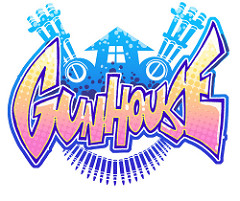 DS: As you’ve made a name for yourself, I imagine it becomes more common that they are more trusting in you and your aesthetic, giving you less restrictions, they hand you the keys as you say. In those instances, do you ever push back for them to give you more creative direction, which in a sense is a restriction that precludes certain avenues of possibility?
DS: As you’ve made a name for yourself, I imagine it becomes more common that they are more trusting in you and your aesthetic, giving you less restrictions, they hand you the keys as you say. In those instances, do you ever push back for them to give you more creative direction, which in a sense is a restriction that precludes certain avenues of possibility?
RV: Yes, there are times when I may not be feeling creatively ambitious. Sometimes I feel a bit directionless, and the creative director has a more focused vision of what the music needs to be. The word direction is right in their title, after all. In those cases, I’m happy to let them take the reins. That’s what happened with the film “It Follows”. David, the director, had a really strong vision of what he wanted, and it made my job easier to be a conduit for him. And that’s what’s happening with “Hyper Light Drifter” a little bit. I’ve had a lot of time and success exploring ideas for that project. But when I’m feeling a bit fatigued creatively, I think it behooves the project to have a dialogue with the project owner so that we might feed off of each other.
DS: Speaking of projects and another restriction, how does time influence your work whether having too much or too little?
RV: When I have too much time I tend to put it off until if I have too little time. I tend to fall into this habit. Sometimes when I have enough time, I’ll do preliminary work here and there but my tendency is to procrastinate.
I think time dictates what you’re able to do, and reality sets in at some point. With “It Follows”, we had three weeks to score the film, so right off the bat I was like “Okay, here are some things I probably can’t do in three weeks”. Things like work with live musicians consistently and have it be good, and write the whole score from complete scratch seemed like stretches. So in that situation, going with my strength being music synthesis, and working from a temp score, were a huge help in being able to score the film in three weeks.
DS: Does a restricted time frame add anything to your work in ways that surprise you?
RV: Yes. It forces me to commit to ideas when maybe I wouldn’t want to normally. Sometimes I have the tendency to dawdle over ideas, so on occasion it’s been nice to have a timeline forcing my hand.
DS: In “Famaze” you limited yourself to using FM Synthesis, that was the aesthetic. Was that a decision you made right away or one you made after trying a few different things?
RV: It was a decision that was premeditated because I had the intention of doing an FM soundtrack before that came along. At that point, I had done a bunch of chiptune stuff but most of it was in a particular kind of style I had created that was inspired mostly by NES music. I had dabbled with FM but nothing that was primarily that. The intent was to hearken back to a particular sound. It was something of a combination of 80’s film soundtrack music and early 90’s PC sound cards. It was, as often is the case for me with bespoke work, an attempt to marry my personal goals to what I thought would benefit the project.
On a similar token, whenever I come up with a musical idea, I save it if I’m not using it right away. I’ll hold on to those ideas for years and then it’s just a matter of finding the right home for it. So when a project comes along that needs new ideas, I have hundreds of them sitting on my hard drive that I can go through. I have goals as a musician for myself and for the ideas that I create, and I relish the opportunity to combine those with whatever’s going to push a project forward in a good direction.
That’s kind of where we are with “Hyper Light Drifter”. It has been harder to make progress lately, so I amassed a very large collection of piano ideas that I thought could fit in the game. Alex, the creative director, and I went through all of them and made notes saying “we think this could work here and that there”. That helped to figure out what kind of music we need and where, and in coming up with themes. I wrote a theme for it, and it was nice but didn’t turn out to be the right fit for the game. Then Alex heard something in one of the piano tracks and realized “Oh, this should be the theme!”. It captures the essence of the game, but I was thinking of it for a particular level, for a deep cavernous place. But he thought “if we use this section at a minute thirty of the recording and then put it together with this other section, it will be a great theme”. I realized he was right. It’s simple, and it’s effective. Part of what happens when I try to write themes, especially on the piano, is I tend to write these through-composed pieces with lots of sections. Then, when I try to bring it into a synth environment, it tends to sound overwrought, too complicated with too many parts. So, we went from a theme that was sixteen bars long to a theme that is three chords.
DS: I’ve always seen themes as a creative restriction that I love to use. Do you tend to write thematic music or does it depend on the project?
RV: It’s something that I’ve dabbled in. “It Follows” has some recurring themes, “Fez” has some recurring themes. There are films and games with themes that recur over and over again in different ways, and it works well! But for whatever reason, I’ve never taken that full plunge. I think I get so excited about new project opportunities, where I can explore all these different sounds and ideas. In that process, I create limitations for myself in other ways, but for some reason, creating a thematic limitation is something I haven’t explored as much as I would like.
DS: Are there any examples where you’ve had a core concept, a restriction that you’ve allowed yourself to break from?
RV: I think there are times when there’s a piece of music I’m trying to write, and I’m trying to adhere to limitations that I’ve set for myself. And I’m struggling to stay within that box and do something that I like. There have been times when I’ve given up on the limitation and written around it. It’s like “okay this works”, it works on other levels, but maybe it doesn’t fit within the thematic limitation. There are times when I feel like I could have been more disciplined, more willing to make mistakes, more willing to iterate on ideas. I think part of that willingness to give in so quickly comes from a place of stubbornness and expectation. Sometimes I expect that I’m going to write something that I really like right away, and when it doesn’t happen, it can be painful. Often when I’m writing, it’s an emotional roller coaster. At times, I haven’t been willing to take the ride, and instead I’ve circumnavigated.
DS: With experience writing music both for film and video games, what are your thoughts on the inherent restrictions in each medium?
RV: What I like about film is the relationship between the music and the visual. It’s one-to-one, the same every time. The potential is there to design moment to moment as it’s not too difficult to do that. Whereas in games, it can be very difficult even to get to the technological point where you can start to think about doing that. There are many factors in being able to change music on the fly — Is the timing appropriate? What’s the gameplay? Does that musical approach even make sense? There are many questions I must ask whereas with film, it’s immediate. I think it’s satisfying if you can make it work in a game, but it’s very very difficult and a lot of times you are limited technically to what you can do. With “Hyper Light Drifter” we don’t have the tech to change pieces of music on a grid, so that’s limited the way I can write the music. It has to be layered, the same kind of structure that moves between versions. If I want to have a shift, I have to create a lull, ambient period where time feels fluid, and then I can start something new. So that’s having to work around the technical limitations.
The other thing about film is the limitation of time. Not just in “It Follows”, but in a lot of the projects offered to me, there’s been an expectation that I’ve got to bang this thing out in a couple of weeks. It’s the total opposite with independent games because there will often be a timeline of a year or longer. But generally speaking, independent games often go way beyond scope and time, and that’s just part of the process because the projects are so often people’s babies. They’re auteurist, the budget is pretty low, and they’re often willing to extend the timeline if need be. So in those cases I tend to have lots and lots of time to explore. I think there are pros and cons to both.
There’s something cathartic about having to write a film score in three weeks. I was engaged the whole time, and I just had to try and nail it. That’s stressful, but I think it pushed me in ways a longer period wouldn’t. Having a long period can be tiresome. I may have all this time and real estate mentally to explore the best possible thing I can do, but that can be overwhelming. Meanwhile, if you only have three weeks, you just have to do it.
The reality is that I create a construct. I have these grandiose ideas about what the music is going to be, what it’s going to sound like, and how it’s going to work. But when I start to write, that process is fluid and unpredictable and often doesn’t fit into that box that I’ve created. Then the question becomes “how do I wrestle these two conflicting sides?” Sometimes it’s helpful just to start writing without thinking about it too much.
Big thank you to Rich for taking the time to speak with us. For more on Rich and his works, visit the links below…
